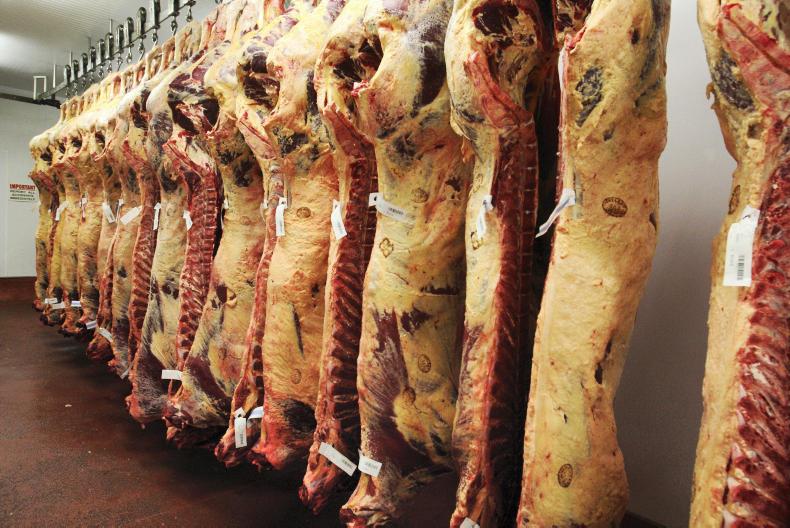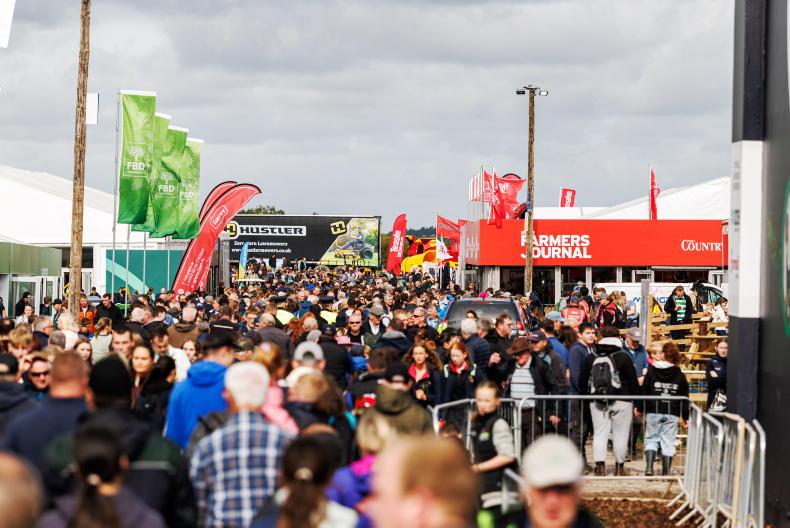With clusters of coronavirus among workers at an estimated six meat factory sites in the Republic of Ireland, and meat shortages starting to hit in the US as the pandemic forces some companies to shut their gates, the industry in NI is on high alert.
To date, no major issues have been reported, and last Thursday Agriculture minister Edwin Poots confirmed that absenteeism among workers in agri-food processing is currently 8.5%, down from a high of 14%.
To try to ensure social distancing, it is understood that the major processing sites in NI have a best-practice protocol in place, agreed with various government bodies including the Health and Safety Executive and DAERA veterinary service. Processing lines are operating slower, workers are temperature-checked for signs of being unwell and some staff have been given specific roles ensuring that everyone follows the rules.
Minimised risk
“We have minimised the risks as far as we can, but at the end of the day, someone could still bring coronavirus into the factory. We can’t remove the risk entirely,” commented an industry source.
He also pointed out that these social distancing measures have all come at a significant cost, and with the rules set to be in place for an indefinite period, it is a major burden on businesses.
The other big issue at the moment is the loss of the foodservice market, which was thought to account for around 30% of beef sales in Britain. To help balance the market, the European Commission has announced a private storage aid scheme for up to 25,000t of beef, and worth €26m.
I can’t see anyone in NI touching the scheme
It requires a processor to freeze a full hindquarter of beef, even though the loss of foodservice has created a specific issue for steak meat such as fillets and sirloin.
“I can’t see anyone in NI touching the scheme,” the chief executive of the NI Meat Exporters’ Association (NIMEA) Conall Donnelly told the Irish Farmers Journal.
We need government to be ready to step in
At present, with prime cattle supplies tight, and UK supermarkets doing major promotions on steaks, the market currently looks slightly better balanced than it did last month. But with restaurants and other catering outlets closed, some smaller meat companies in particular are under significant pressure. And as cattle supplies start to increase in the second half of the year, prices to farmers could come under renewed pressure.
“We need government to be ready to step in and support farmers,” said Donnelly.
Different approach
He also pointed to the different approach taken in the Republic of Ireland, where processors can potentially access a government wage subsidy scheme, to that in NI where large businesses are expected to cover the likes of social distancing measures.
If the state doesn’t share the cost burden of coronavirus, it is going to make recovery for NI business much more difficult
“With new post-Brexit arrangements around the corner, we really need to consider whether there is a level playing field for business across this island. If the state doesn’t share the cost burden of coronavirus, it is going to make recovery for NI business much more difficult,” he suggested.
Adding to frustration is the slow progress made opening up markets in the likes of the US and China, both of which are facing potential meat protein shortages this year. Unlike NI counterparts, southern Irish beef exporters have a foothold in both markets.
China
In the case of China, last October WD Meats in Coleraine was among four UK companies cleared to export product. But as yet, UK officials are yet to agree notes for guidance to accompany a health certificate, that would allow actual product to move.
Read more
Northern Ireland beef destined for China
COVID-19 positive workers self-isolating – Rosderra Meats
With clusters of coronavirus among workers at an estimated six meat factory sites in the Republic of Ireland, and meat shortages starting to hit in the US as the pandemic forces some companies to shut their gates, the industry in NI is on high alert.
To date, no major issues have been reported, and last Thursday Agriculture minister Edwin Poots confirmed that absenteeism among workers in agri-food processing is currently 8.5%, down from a high of 14%.
To try to ensure social distancing, it is understood that the major processing sites in NI have a best-practice protocol in place, agreed with various government bodies including the Health and Safety Executive and DAERA veterinary service. Processing lines are operating slower, workers are temperature-checked for signs of being unwell and some staff have been given specific roles ensuring that everyone follows the rules.
Minimised risk
“We have minimised the risks as far as we can, but at the end of the day, someone could still bring coronavirus into the factory. We can’t remove the risk entirely,” commented an industry source.
He also pointed out that these social distancing measures have all come at a significant cost, and with the rules set to be in place for an indefinite period, it is a major burden on businesses.
The other big issue at the moment is the loss of the foodservice market, which was thought to account for around 30% of beef sales in Britain. To help balance the market, the European Commission has announced a private storage aid scheme for up to 25,000t of beef, and worth €26m.
I can’t see anyone in NI touching the scheme
It requires a processor to freeze a full hindquarter of beef, even though the loss of foodservice has created a specific issue for steak meat such as fillets and sirloin.
“I can’t see anyone in NI touching the scheme,” the chief executive of the NI Meat Exporters’ Association (NIMEA) Conall Donnelly told the Irish Farmers Journal.
We need government to be ready to step in
At present, with prime cattle supplies tight, and UK supermarkets doing major promotions on steaks, the market currently looks slightly better balanced than it did last month. But with restaurants and other catering outlets closed, some smaller meat companies in particular are under significant pressure. And as cattle supplies start to increase in the second half of the year, prices to farmers could come under renewed pressure.
“We need government to be ready to step in and support farmers,” said Donnelly.
Different approach
He also pointed to the different approach taken in the Republic of Ireland, where processors can potentially access a government wage subsidy scheme, to that in NI where large businesses are expected to cover the likes of social distancing measures.
If the state doesn’t share the cost burden of coronavirus, it is going to make recovery for NI business much more difficult
“With new post-Brexit arrangements around the corner, we really need to consider whether there is a level playing field for business across this island. If the state doesn’t share the cost burden of coronavirus, it is going to make recovery for NI business much more difficult,” he suggested.
Adding to frustration is the slow progress made opening up markets in the likes of the US and China, both of which are facing potential meat protein shortages this year. Unlike NI counterparts, southern Irish beef exporters have a foothold in both markets.
China
In the case of China, last October WD Meats in Coleraine was among four UK companies cleared to export product. But as yet, UK officials are yet to agree notes for guidance to accompany a health certificate, that would allow actual product to move.
Read more
Northern Ireland beef destined for China
COVID-19 positive workers self-isolating – Rosderra Meats








SHARING OPTIONS